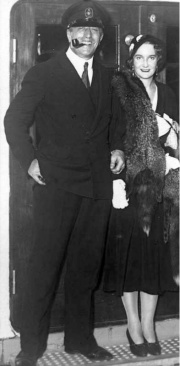Introduction↑
Felix Graf von Luckner (1881-1966), fourth son of Heinrich Wilhelm Graf von Luckner (1833-1919) and his second wife Marie Magdalene (1857-1950), ran away from home to join the merchant navy in 1896. Until 1911, interrupted only by his military service in the Imperial German Navy from 1903-1904, he lived an unsteady life, earning his living by working as a seaman, a professional boxer, an assistant lighthouse-keeper, a magician, and even as a carney in many countries all over the world. Married in 1910, he eventually reentered the Imperial Navy in 1911. In 1913, he became commander of the gun-boat S.M.S. Panther and left Germany for a patrol of the German colony Cameroon.
Wartime↑
After the outbreak of war in August 1914, Count Luckner joined the High Seas Fleet. As gunnery officer he took part in the Battle of Jutland in 1916 on board of the battleship S.M.S. Kronprinz. Soon after, he became commander of the merchant raider Seeadler, a sailing vessel. Successfully breaking the British blockade in the North Sea, he sank fourteen ships totaling 60,000 tons on a 35,000 mile-long journey to the South Sea between December 1916 and August 1917. He became well-known as a cunning, courageous, but always gallant raider who did his best not to harm his victims. Only one foreign sailor lost his life during these raids. In August 1917, the Seeadler ran onto a reef off the island of Mopelia and had to be abandoned. Although he tried to escape in a small boat, Luckner and five of his men were taken prisoner on Wakaya Island (Fiji).
Post-war↑
Returning to Germany after two years imprisonment following the signing of the Treaty of Versailles in 1919, Luckner joined the navy again, now renamed the Reichsmarine. However, he had to leave in 1922 after increasing quarrels about his attempts to exploit his fame as war-hero while commanding the navy’s training vessel Niobe. Luckner emigrated to Sweden, where he married his second wife. He published his first book about his deeds as early as 1920. Soon after, he travelled around the world in his own sailing vessel, the Vaterland, giving talks about his wartime adventures and enjoying his fame. He returned to Nazi Germany in 1933. Back in Germany, Luckner never joined the Nazi Party nor openly supported Nazi ideology. He used his fame to win over Adolf Hitler’s (1889-1945) support for his vessels and travels. In 1939 he was accused of incest and rape but was never convicted following an order by Hitler personally. Prior to this, Luckner had admitted the charges against him.
His role in saving the life of a Jewish woman from deportation and death during the war is unclear. Though a letter from this woman from 1951 seemed to validate this claim, Yad Vashem officials regarded this letter as well as Luckner’s own account as insufficient evidence to honour him. In April 1945, he helped save the city of Halle/Saale from destruction by U.S. forces.
In post-war Germany Luckner was still a popular man who enjoyed talking about his adventures and would tear up thick telephone books to show his personal strength. Today historians have great doubts about the truth of many of his adventurous tales. Moreover, his fame suffered a severe setback when the files about the charges against him became public.
Michael Epkenhans, Zentrum für Militärgeschichte und Sozialwissenschaften der Bundeswehr
Section Editor: Mark Jones
Selected Bibliography
- Bade, James N.: Von Luckner. A reassessment. Count Felix von Luckner in New Zealand and the South Pacific, 1917-1919 and 1938, Frankfurt am Main 2004: Peter Lang.
- Frankenstein, Norbert von: 'Seeteufel' Felix Graf Luckner. Wahrheit und Legende, Hamburg 1997: DSV.
- Luckner, Felix, Graf von: Der Seeteufel erzählt, Halle 1933: Schroedel.
- Luckner, Felix, Graf von: Seeteufel. Abenteuer aus meinem Leben, Leipzig 1921: Hase & Koehler.
- Luckner, Felix, Graf von: Im Segelschiff um die Welt, Cologne 1935: Hoursch & Bechstedt.
- Luckner, Felix, Graf von: Seeteufel erobert Amerika, Leipzig 1928: Koehler & Amelang.
- Luckner, Felix, Graf von: Aus siebzig Lebensjahren, Biberach an der Riss 1955: Koehler.
- Luckner, Felix, Graf von: Ein Freibeuterleben, Dresden 1938: Wodni & Lindecke.
- Seilkopf, Wolfgang (ed.): Aus dem Leben des 'Seeteufels'. Briefe und Aufzeichnungen, Halle (Saale) 2000: Mitteldeutscher Verlag.
- Sperk, Alexander / Bohse, Daniel: Legende, Opportunist, Selbstdarsteller. Felix Graf Luckner und seine Zeit in Halle (Saale) 1919-1945, Halle (Saale) 2016: Mitteldeutscher Verlag.
- Thomas, Lowell: Count Luckner. The sea devil, Garden City 1927: Doubleday, Page & Company.








